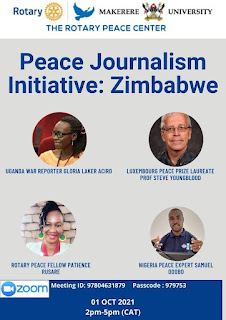Zimbabwean journalists discuss Uganda, Nigeria, polarization
The second of four peace journalism training sessions for
Zimbabwean journalists was held last Friday via Zoom.
The second presenter, Gloria Laker from Uganda, related
her extraordinary experiences reporting the LRA war in Northern Uganda. She
confessed that some of the reporting about the conflict done by her and her
colleagues helped to fuel the war. Laker said she “took it as a personal
responsibility” to improve reporting about the conflict. Since the war, Laker
has been instrumental in spreading peace journalism in Uganda, including
launching the Peace Journalism Foundation and Refugees Online Network. The
Zimbabwean participants found her presentation fascinating, and inspiring.
I concluded the session by talking about polarization and
peace journalism. I discussed a study by Afrobarometer (disputed by one
participant) that Zimbabwe is the most polarized country among those surveyed.
I gave examples of media fueling polarization around the world in reporting about politics,
civil unrest, and even the pandemic. I closed by discussing how PJ might reduce
polarizing Covid coverage. These tips included not intruding on victims or
their families; not sensationalizing; giving voice to the voiceless poor and
marginalized who have been most impacted by the pandemic; and using real
experts (virologists, epidemiologists, public health workers) as sources rather
than politicians and faux-experts.
My session today was part of a peace journalism training
program sponsored by the Rotary Peace Center at Makerere University in Kampala,
Uganda. The project is headed up by Rotary Peace Fellow Patience Rusare. The
project will continue with a session November 1, then conclude with a December
1 seminar.


No comments:
Post a Comment